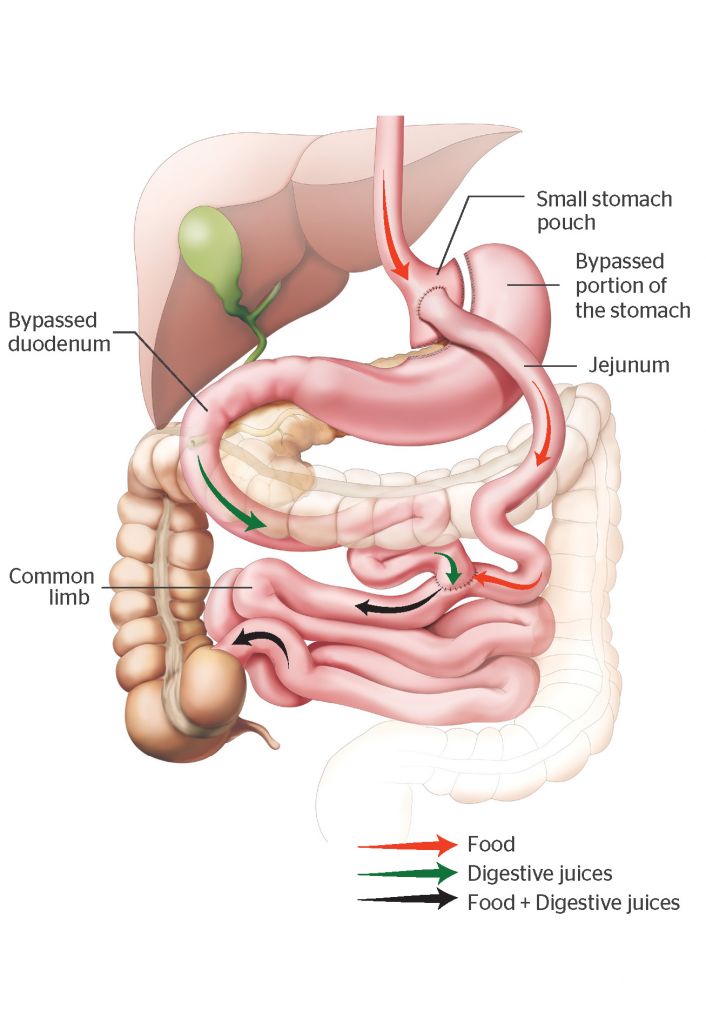Gastric bypass surgery is a life-changing procedure that can help you achieve significant weight loss and improve your overall health. At Southern Weight Loss, we understand that losing weight can be challenging, and we are here to help you every step of the way. Our experienced team will work closely with you to develop a personalised treatment plan that meets your individual needs and goals.
Gastric bypass surgery is a form of metabolic and bariatric surgery and has been performed for over 50 years. It is the benchmark against which other bariatric interventions are compared. Gastric bypass surgery not only reduces how much you can eat, but it also makes you feel less hungry. This is because it interferes with the hormones that control your appetite to lose weight.
After 12- 18 months, weight loss ranges from 65-80% of your excess weight. In many cases, this is well maintained. On average, a typical patient who is 50 kilogrammes overweight, will lose between 32.5 – 40 kilogrammes after gastric bypass surgery.
Gastric bypass surgery is performed using keyhole surgery. A small pouch is formed from the top of your stomach, and this limits your meal size to about 50mls. A limb of the small intestine is then joined to this pouch. The rest of your healthy stomach and the first 150cm of small intestine are bypassed. Your digestive enzymes can still mix with your food, enabling nutrient absorption. This occurs further along your bowel than before Gastric bypass surgery.
After Gastric bypass surgery, you will stay in the hospital for one-two nights. and usually return to work within two weeks. However, each patient is different.
Gastric bypass surgery modifies the hormones that play a role in medical conditions such as:
- Type 2 Diabetes Mellitus, which may be cured in up to 90% of patients
- High cholesterol levels have returned to normal in over 70% of patients
- High blood pressure is cured in over 30% of patients, with a reduction in medication for the rest
- Obstructive sleep apnoea may be resolved in up to 80% of patients
Complications are unusual once discharged from the hospital, but may include:
- A narrowing at the joint between the stomach pouch and the small intestine. This narrowing may cause eating difficulties and may need an endoscopy to stretch up the joint
- Internal hernias, which may require further surgery. There is an approximate 3% lifetime risk
- Patients require life-long surveillance, and vitamin and mineral supplementation after Gastric Bypass surgery
- Dumping syndrome, which can cause nausea, weakness, sweating, and diarrhoea. It is often triggered by sugary foods
- The published mortality rate after Gastric bypass surgery is below 1 in 1000 cases
- The risk of severe complications such as bleeding, infections, and thromboembolism is less than 5%
As with any surgical procedure, gastric bypass surgery carries some risks, including infection, bleeding, blood clots, and leaks from the surgical site. Our team takes every precaution to minimise these risks and ensure a safe and successful surgery.
Before undergoing gastric bypass surgery, you will undergo a thorough evaluation to determine if you are a suitable candidate for the procedure. This may include medical tests, consultations with our team, and discussions about your goals and expectations. You will also receive guidance on how to prepare for surgery, including dietary changes and lifestyle modifications.
FAQs
Who is an ideal candidate for gastric bypass surgery?
Weight loss surgery, also called bariatric surgery, is typically considered for people with severe obesity. Generally, this means having a body mass index (BMI) of 35 or more, or a BMI of 30 or more with serious weight-related health conditions like diabetes or sleep apnea. However, qualifications can vary, so consulting a doctor is crucial
What can I expect after surgery?
Following surgery, you will likely experience some soreness and discomfort. However, minimally invasive laparoscopic techniques generally lead to a faster recovery time compared to traditional open surgery. You will be provided with specific post-surgical instructions regarding diet, exercise, and medications. Strict adherence to these instructions is crucial for optimal healing and successful weight loss.
Southern Weight Loss and Laparoscopy Limited offers comprehensive aftercare support, including follow-up appointments and guidance on maintaining a healthy lifestyle.
Does insurance cover gastric bypass surgery?
Insurance coverage for gastric bypass surgery varies depending on your specific insurance provider and plan. We recommend contacting your insurance company to determine their coverage policy for weight loss surgery. Southern Weight Loss and Laparoscopy Limited can assist you with the pre-authorization process to help maximise your insurance coverage.
What are the long-term results of gastric bypass surgery?
Studies show that gastric bypass surgery can lead to significant and rapid weight loss. However, long-term success depends on your commitment to a healthy lifestyle. Southern Weight Loss and Laparoscopy Limited provides ongoing support and resources to help you maintain a healthy weight and improve your overall well-being.


